In this article:
When you hear “healthy teeth,” the first thing that probably comes to your mind is a good brushing, flossing, and mouthwash routine.

But have you paid attention to the food you eat? – not just limiting candy and high-sugar foods, which is a necessary measure in maintaining tooth health, but foods that can strengthen teeth from within.
How Do Foods Impact Dental Health?
Teeth are part of the skeletal system and are made of minerals including calcium, phosphorus, magnesium, and vitamin D. A deficiency in any of these nutrients can cause weakness of the teeth and even tooth loss. (1)
Therefore, consuming foods that are rich in these nutrients is critical for healthy and strong teeth.
Top Foods for Healthy Teeth
Consume these foods to maintain healthy teeth and oral cavity.
1. Milk
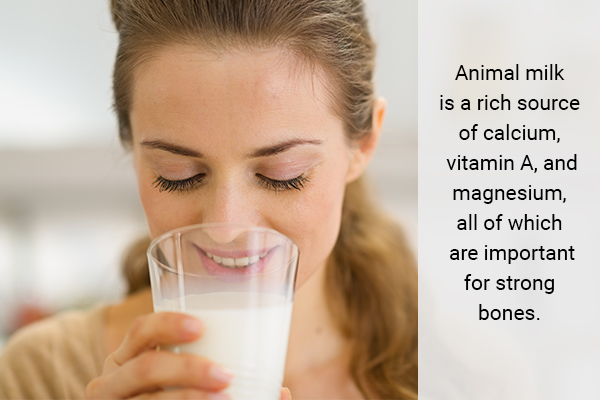
Animal milk is a rich source of calcium, vitamin A, and magnesium, all of which are important for strong bones. (2)
Consumption of milk has also been linked to a reduction in dental caries caused by bacterial growth. The protein in animal milk – casein and lactoferrin – prevents the attachment of caries-causing bacteria such as streptococci. (3)
Milk peptides also promote the mineralization of teeth for optimal tooth health. (3) Consume 1 glass of milk to maintain healthy teeth and prevent dental caries.
2. Yogurt
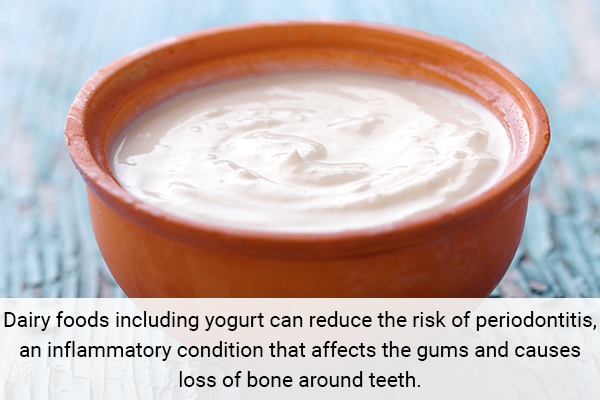
Dairy foods including yogurt can reduce the risk of periodontitis, an inflammatory condition that affects the gums and causes loss of bone around teeth. (4)
In a study on Korean adults, less intake of yogurt was observed in people suffering from periodontitis. (4) Moreover, in a study done on older adults, probiotic yogurt proved to be an effective antibacterial against plaque-causing bacteria. (5)
Thus, consuming yogurt as part of a healthy diet can be protective against bacteria and periodontitis.
3. Fatty fish
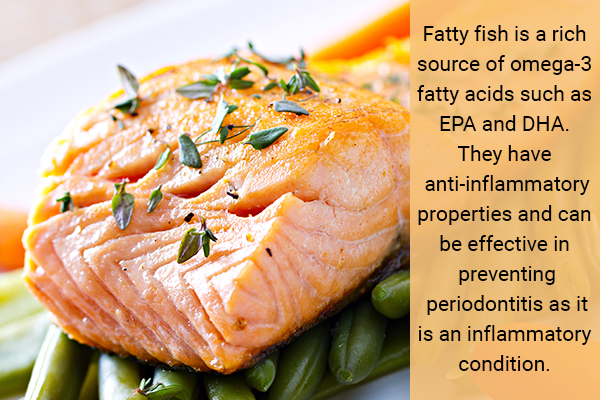
Fatty fish is a rich source of omega-3 fatty acids such as EPA (eicosapentaenoic acid) and DHA (docosahexaenoic acid). They have anti-inflammatory properties and can be effective in preventing periodontitis as it is an inflammatory condition. (6)
In a trial of 30 adults with periodontitis, an improvement was observed with the consumption of EPA and DHA. (6)
According to the American Heart Association, two servings of fatty fish each week can be useful in reducing the risk of periodontitis. (6)
4. Green leafy vegetables

Green leafy vegetables are a rich source of antioxidants and polyphenols that can be beneficial for teeth and oral health. (7) The vitamin A from leafy vegetables can improve teeth and gum health and speed up healing after surgeries. (7)
Furthermore, the high amounts of fiber in green leafy vegetables are also suggested to improve periodontal disease and can reduce halitosis (bad breath). (8)
5. Cranberries
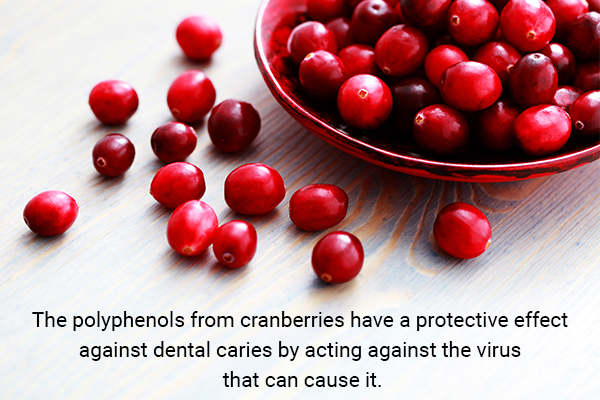
The polyphenols from cranberries have a protective effect against dental caries by acting against the virus that can cause it. (9)
Test-tube studies have shown nutrients in cranberries can have a beneficial effect on gingivitis, a type of inflammatory gum disease that causes redness and pain, as well as periodontitis. It can also prevent the formation of bacteria on teeth to reduce dental caries. (9)
Cranberry or its unsweetened juice can be consumed for good oral and teeth health.
6. Apple
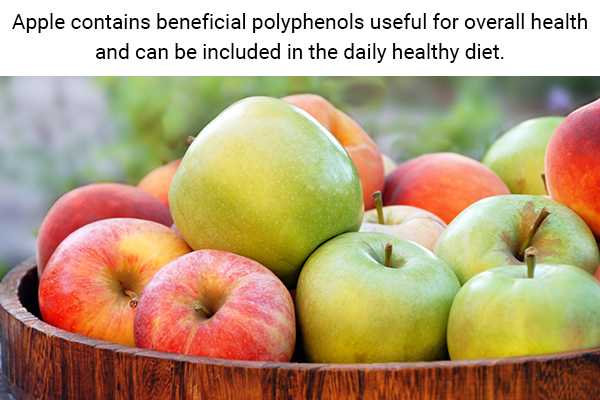
Apple is considered a “natural toothbrush.” It was believed that consuming high-fiber foods such as apples could have an antiplaque effect by brushing away food debris from inaccessible areas of teeth and gums.
However, later studies established that apples had no effect on removing plaque, (10) although chewing apples reduced the bacterial content of saliva much like brushing teeth did. (10)
Regardless, apple contains beneficial polyphenols useful for overall health and can be included in the daily healthy diet.
7. Ginger
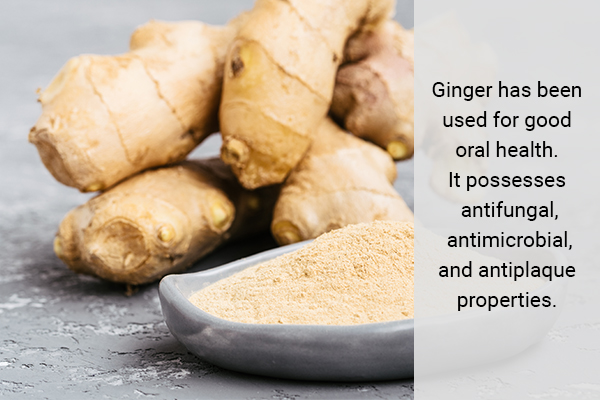
Ginger has been used for good oral health. It possesses antifungal, antimicrobial, and antiplaque properties. It may also be beneficial in preventing oral cancer and reducing dental caries. (11)
In a study done on people with type 2 diabetes, ginger was effective in reducing inflammation, preventing oxidative damage, and improving the periodontal status associated with type 2 diabetes. (12)
8. Green tea
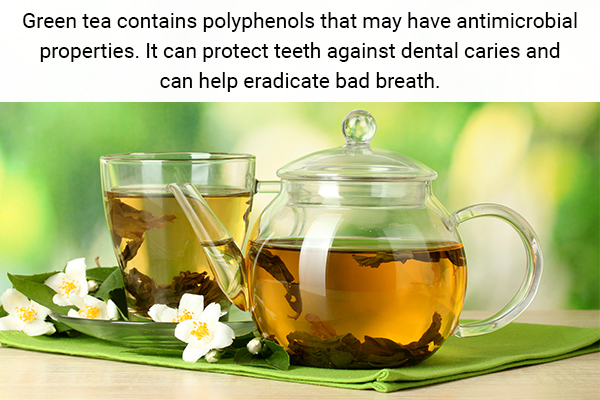
Green tea contains polyphenols that may have antimicrobial properties. It can protect teeth against dental caries and can help eradicate halitosis. It can also prevent the formation of oral cancer. (13)
Green tea can also combat oral oxidative damage and inflammation due to smoking. (14)
Precautions to Consider
- Some acute infections may need medication, and it is advisable to consult a doctor instead of turning to natural remedies to ease inflammation.
- Natural remedies are meant to play a preventative role.
- Do not overconsume green tea as it may cause sleep disturbances and other side effects. (14)
Additional Tips for Healthy Teeth
- Limit the consumption of sugary snacks, cakes, or sticky chewy candies. (15)
- Limit high-starch food such as potatoes and rice. Rinse the mouth very well after eating such foods. (15)
- Drinking soft drinks and beverages can cause dental disease. It is important to limit their consumption for healthy teeth. (16)
- Avoid smoking and drinking alcohol (17)
- Brush your teeth twice a day, floss, and use mouthwash once a day.
- Visit your dentist every 6 months for an oral exam and tooth cleaning.
Most-Asked Questions
Is using mouthwash good for teeth?
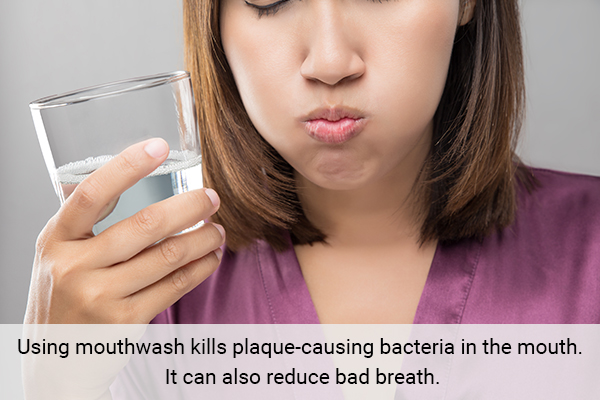
Using mouthwash kills plaque-causing bacteria in the mouth. It can also reduce bad breath. However, precaution needs to be taken not to use mouthwash immediately after brushing and not to combine mouthwashes. (18)
What is the best toothpaste?
Several toothpaste formulations are available nowadays with claims to improve gum health, whiten or strengthen teeth, ease pain, etc. It is advisable to consult a doctor to determine the best brand suitable for you.
Can certain medications damage your teeth?
Some prescription, over-the-counter, and herbal medications can affect the teeth and gums. (19) These include medications for depression, allergies, and blood pressure, aspirin (chewing the tablets), certain asthma medications (maybe highly acidic and can dissolve tooth enamel), and chemotherapy medication (can lead to dry mouth and increased gum issues).
It is recommended to take medication as directed by your healthcare provider, especially aspirin (swallowed with water instead of being allowed to dissolve in the mouth). If you feel like the medications you are consuming are causing dental issues, consult your doctor about a fluoride rinse or a fluoride gel for brushing.
Final Word
Good oral health includes maintaining good teeth and gum health. In addition to brushing, flossing, and using mouthwash, some foods can help maintain strong teeth, prevent bacteria from sticking to the teeth, reduce the inflammation associated with periodontitis, and even prevent oral cancer.
- Was this article helpful?
- YES, THANKS!NOT REALLY


